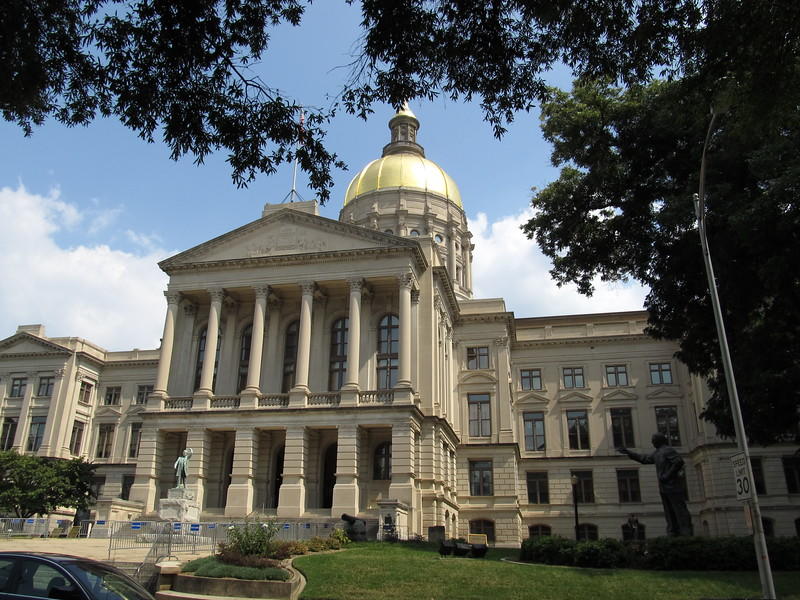Section Branding
Header Content
Political Rewind: Lawmakers Consider In-State Tuition For DACA Recipients
Primary Content
Tuesday on Political Rewind, we looked into current legislative efforts in the General Assembly. Several bills in the state legislature this month focus on access to higher education for immigrants who have been granted a temporary reprieve from deportation — specifically those covered by the Deferred Action for Childhood Arrivals program, known as DACA.
One of those bills is backed by Democrats lawmakers including House Minority Leader Robert Trammell, while another is supported by a small bipartisan group of legislators.
Tuesday night, the front-runners in the race for the Democratic party nomination for president take the stage in South Carolina for a debate ahead of Saturday’s crucial primary.
What can we expect from the candidates after a lively performance last week during the debate in Nevada?
Panelists:
Adam Van Brimmer — Executive Editor, Savannah Morning News
Tamar Hallerman — Senior Reporter, The Atlanta Journal-Constitution
State Sen. Jen Jordan — D-Atlanta
Ted Terry — Mayor of Clarkston
Transcript Highlights:
This transcript has been edited for clarity and conciseness
On legislative efforts to change regulations concerning the disposal of coal ash:
Bill Nigut: State Sen. Jordan, you had the Capitol filled with people from the town of Juliette, Georgia. Plant Scherer is down there; the largest coal fired plant in the state. It's shutting down and the disposal of coal ash in that community into pits that you and others in the legislature feel are unsafe because they're not lined. That has led to concerns that their water has been contaminated. They're looking for solutions. And so you're one of the sponsors of a Senate version of a bill to deal with this.
Jen Jordan: Yes. So, the deal is that when the coal fired plants were working, they would take the ash is from that process and they would put it into these ponds. The problem is most of these power plants are on rivers and waterways.
And so, when you dig down and you start putting this ash in there, which has arsenic and selenium and all this bad stuff, it actually hits the waterline, the water table. And so, you had this stuff kind of leaching into the groundwater.
The reason that Juliette has come up is because most of the folks that live in that area actually still get their water from wells. They're actually drinking contaminated water. And people have been getting sick.
The issue really though is, statewide, because there are five power plants statewide that have coal ash ponds that aren't lined and that Georgia Power does not plan to line, per what they've said. And, in fact, Plant McDonough on the Chattahoochee River in my district has three large coal ash ponds that aren't lined. Right by the Chattahoochee River.
And so maybe we haven't seen the effects in terms of drinking contaminated water because we have county and city water systems. But at the end of the day, we are all Juliette. And we have all got to work on this problem to make sure these ponds get lined.
Nigut: The bill would call for lining those pits and ponds. Adam Van Brimmer, George Power says that they are disposing of coal ash according to state rules and regulations. But that's exactly what people like [State Sen.] Jen Jordan are trying to change.
Adam Van Brimmer: Yeah, and it's interesting because we just went through a cycle with the Public Service Commission in terms of changing the power rates for Georgia Power. One of the big expenses had to do with cleaning up the coal ash. And then we see things like this so soon after that where it looks like, are they doing half-measures? What are they really out to achieve? And are we going to see some real difference making here or are we just going to kind of plug the hole and try to get everybody to quiet down and go about our business.
Nigut: We've looked at it at an administration in Washington that has rolled back many environmental regulations, some of which were put in place by executive action by President Obama. And so it's a little bit harder for me to get a sense — given that President Trump has been able to do these things and get praise from industry for the way he's acted— and yet the environment remains an issue that people across the country, in communities across the country, continue to care about a great deal and especially when something like this comes up.
Tamar Hallerman: Sure. Absolute crisis mode when you're talking about water actually getting trucked in like what you're seeing in Juliette.
And one thing I want to throw out there that's important is that Georgia also gets imported coal ash from other states and even from places like Puerto Rico that come through places like Jacksonville. And are brought to Georgia because it's so much cheaper to dispose of it here in Georgia, because they aren't required to use things like liner in these pits that you were mentioning. So not only is it our own coal ash, but the stuff that's brought in.
Nigut: Is this divided completely along partisan lines downtown?
Jordan: You know, what's interesting is that these are normally the issues that would be. But we're starting to see kind of a divide. For example, addressing what Tamar was talking about; out of the Senate yesterday, we passed a bill that was sponsored by state Sen. Bill Ligon, who represents the coast. The bill increased the cost of bringing coal ash into the state.
And so the whole point is going forward, at least, let's try to stop all this ash coming in. Does not really help what we got, but going forward it may help. But state Sen. Ligon is a Republican and a clear conservative. But, it's one of those things where a lot of Republicans on the coast are seeing the effects of climate change and so you're starting to see these different alliances with representatives or senators who are being really affected in terms of their constituencies. So, we are starting to see a clear change here.
Nigut: People in their own communities understand. I mean, if representing a community that has environmental concerns, you can't afford to be liberal or conservative. You've got to work to help your constituents.



